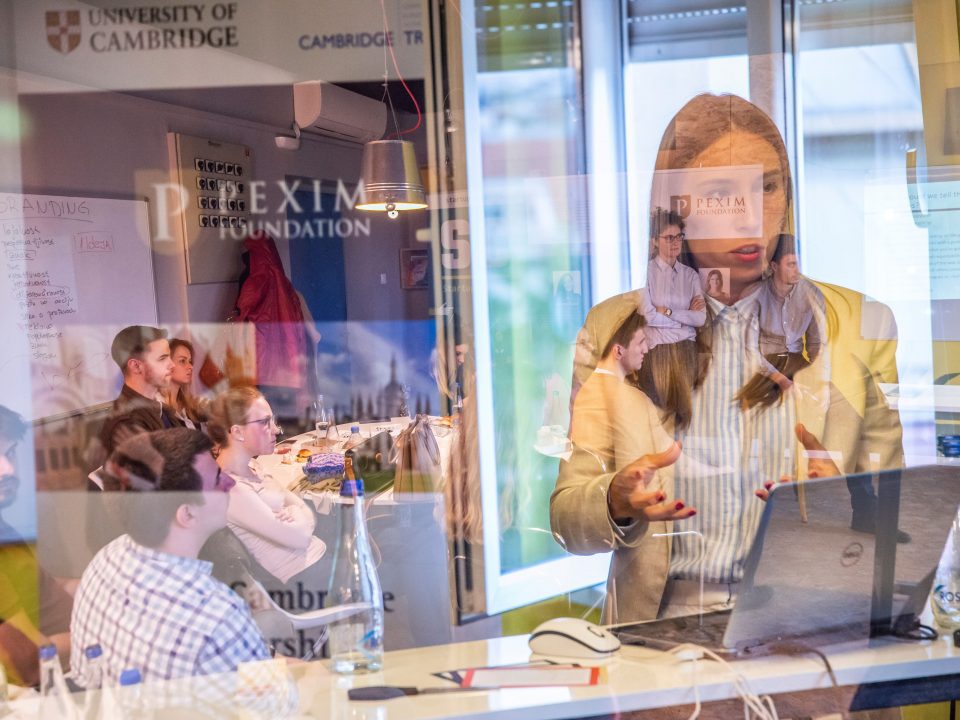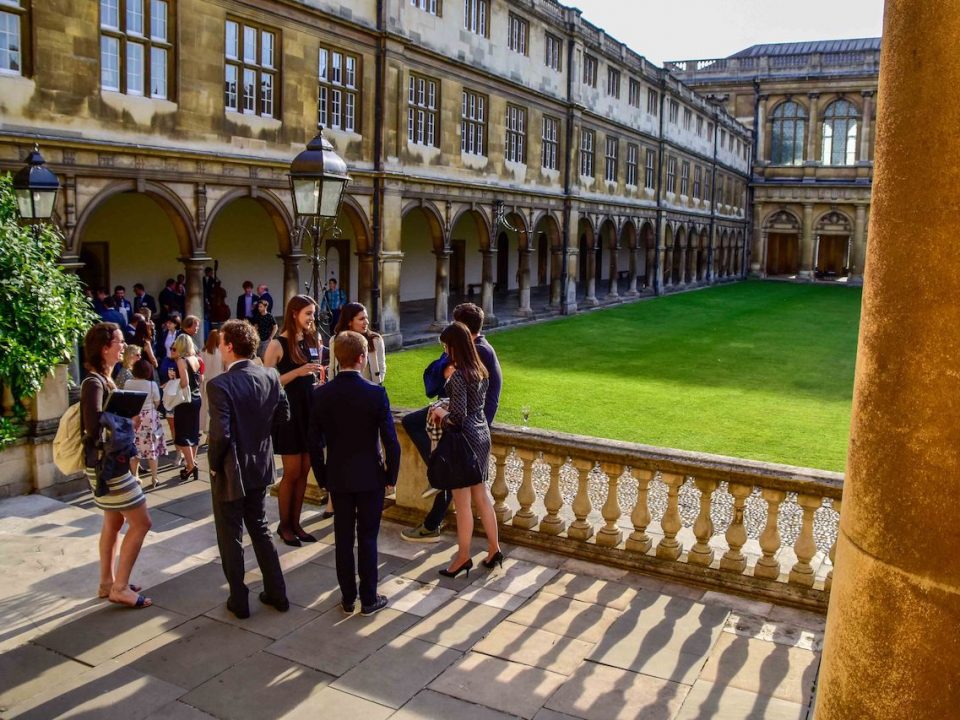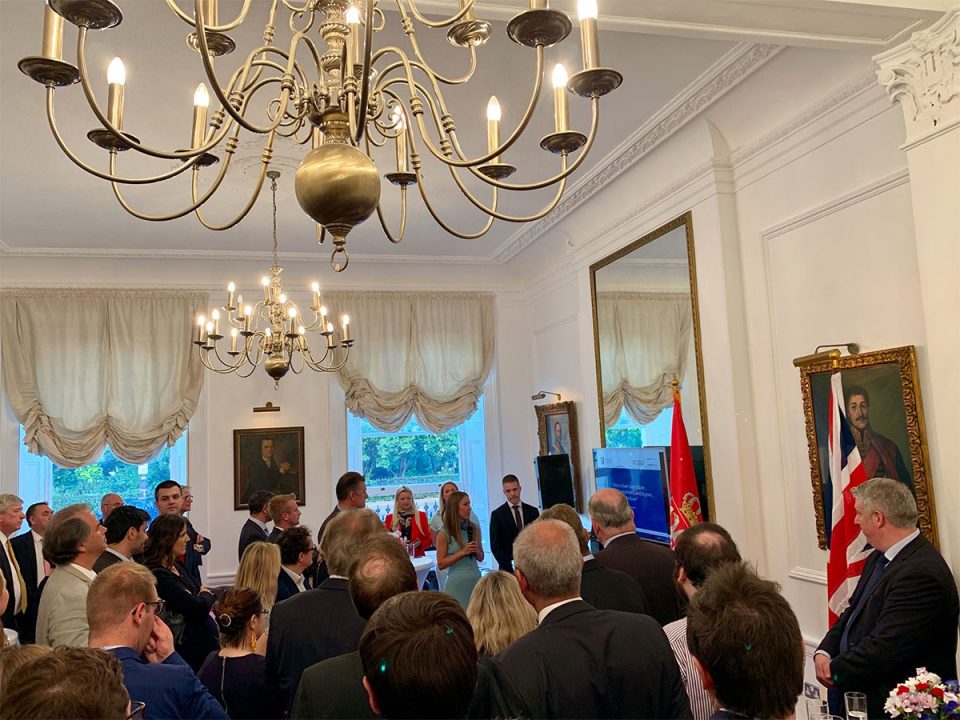
The PEXIM Foundation becomes member of the British Serbian Chamber of Commerce
1 January 2012
British-Serbian dinner at Cambridge University
10 May 2012About Sir Paul Judge
Chairman of the British-Serbian Chamber of Commerce and Greenhouse Capital
Sir Paul Judge, 62, is an English business and political figure. He was educated at school in London and then at Trinity College, Cambridge, and at the Wharton School of the University of Pennsylvania as a Thouron Fellow. His early career was with Cadbury Schweppes where he undertook a number of international postings and projects and where he led the buyout of their food companies in 1985 to form Premier Brands which was successfully sold in 1989. In the 1990s he was Chairman of Food from Britain, Director General of Britain’s Conservative Party and a Ministerial Adviser at the United Kingdom Cabinet Office. In the 2000s he was Chairman of the Royal Society of Arts and President of the Chartered Management Institute.
As well as being Chairman of the British-Serbian Chamber of Commerce and of Greenhouse Capital Group which operates in Belgrade, his appointments currently include: President of the Chartered Institute of Marketing and of the Association of MBAs, UK chairman of the British-North American Committee, a special adviser to the Royal Institute of International Affairs, a member of the Russian Presidential Academy of National Economy and Public Administration, an Emeritus Trustee of The Cambridge Foundation and a member of the University of Cambridge’s Alumni Advisory Board. In 1990 Sir Paul founded the Judge Business School at the University of Cambridge.
He is married to Lady Barbara Judge, Chairman of the United Kingdom Pension Protection Fund, former Chairman of the UK Atomic Energy Authority, current Business Ambassador for UK Trade and Industry; and has two sons.
1. It’s been two months since you were made the Chairman of the British-Serbian Chamber of Commerce. Do you have any special strategy to improve foreign investment to Serbia? Are British investors expressing more interest to invest in our country recently, and are any serious investors planning to start new or buy businesses (local companies) in Serbia this year?
The Chamber wants to enhance networks and communication between the two economies. Serbia remains very much on the radar of UK business. Trade missions over the past six months have significantly increased with recent visits to Serbia by delegations from the British security, railway and business training industries. UK Trade and Industry, the Commercial Section of the British Embassy in Belgrade, has had its busiest-ever year in terms of enquiries, trade missions and other initiatives. British companies will choose, from a global marketplace, an investment destination where returns are maximised and risks are minimised. Serbia has a lot of characteristics to recommend it: a great geographic location, a talented pool of workers, and an EU perspective which will encourage government’s drive for further economic reform.
Companies will however not invest unless they can believe in the rule of law and the absence of corruption. The Chamber and its leading members like international audit firm KPMG want to help UK companies become assured that Serbia is firmly committed to an ambitious path of labour, capital and market reforms, sound fiscal management, and improvements in the investment environment. If it can do this – along the lines of those proposed by foreign investors’ bodies in Serbia and by respected global comparisons such as the Doing Business Guide and Global Competitiveness Report – Serbia will find itself especially well-placed to take advantage of resurging British investment.
2. You are an important figure in business and British political life, and you have a great career. What are your reasons for accepting the position to be the chairman of the British-Serbian Chamber of Commerce? Recently you said “Serbia has significant and growing investment potential“. How can Serbia enhance its potential for economic development?
I believe that following its very difficult recent history, Serbia can now hope to enjoy a much improved economy. The EU’s positive decision on candidate status is very important for the investment climate in Serbia. Reduced bureaucracy and lower administration costs place the country in a strong position when compared with its surrounding markets. In addition Serbia can further improve its opportunities by enhancing business and investment-friendly policies and by building on its strengths with its strategic position in South East Europe, its excellent network of tax and other treaties and its potential in important industries such as agriculture. Investments from other countries, such as the Fiat car plant in Kragujevac and the potential of the South Stream gas pipeline, will generate interest from British investors in allied industry sectors.
As liquidity returns to the financial markets there will be much competition for debt and equity capital which means that Serbian businesses must work hard to improve the attractiveness of their enterprises. Undertaking the necessary financial and operational restructuring cannot be avoided if Serbian companies are to secure inward investment and strategic partnerships successfully.
The Chamber will work hard to support Serbian companies seeking financial investors, strategic partners and new markets in the United Kingdom while leveraging the benefits of EU candidacy, as well as the EU Stabilisation and Association Agreement which remains to be ratified by Belgium, Lithuania and Romania.
3. Why do we have such a poor record of British investment to Serbia up to now?
In 2011 Serbia exported about € 110 million to the UK and imported € 130 million from the UK so there is already a reasonable flow of trade. In terms of investment however the official British record is perhaps misleading. London remains Europe’s primary equity and debt capital market and a lot of investment and restructuring for Serbia and Serbian companies is done through London. Many British-funded investment vehicles operate outside the UK for tax reasons through holdings in, for example, Switzerland, the Netherlands or Cyprus and their investments are recorded in Serbia as being from those countries even though the money has come from the UK.
Serbian businesses seeking Western capital must recognise that they must meet the requirements for enhanced financial disclosure and compliance which are commonplace in international markets like London. A resistance to transparent disclosure can make it challenging for British investors to engage with Serbian businesses, especially when many local financial institutions have not conducted a deep financial analysis of the organisations which they support. This points to a need to improve the legal and financial due diligence systems currently deployed in Serbia so that investors receive a fair view of business performance and management. Investment must normally be of a significant size to attract London capital, for example a minimum of € 20m.
Investors need to have as much certainty and confidence as possible when deploying capital into Serbia and a lot more can be done by Serbian business leaders to restructure their enterprises and make themselves investor-ready and fit-for-purpose in order to secure international investment.
4. As a part of the celebrations for Serbian Month in Great Britain 2012, you hosted the evening business reception at your home in Central London. What did you speak about, and what are your impressions of Serbian people?
I firstly emphasised the close historical relationships between the UK and Serbia. This year is the 175th Anniversary of diplomatic relations between the two countries. In addition in 2013 the world will be celebrating the 1700th Anniversary of the decision by the Emperor Constantine in 313 to legalise Christianity in the Roman Empire, one of the most important proclamations in history. This brings together Serbia and Britain as Constantine was born in Nis in Serbia and became Emperor while he was in the city of York in Britain.
I also talked about the potential for building upon the progress that Serbia has made in the last decade, culminating in its becoming an EU candidate country. It is clear that many other countries which had a long period of communist rule and then a difficult period of adjustment have now become places of stability and transparency. Serbia deserves to achieve the same transformation which should allow it to achieve growth rates well above those of Western Europe as Adam Smith’s “invisible hand” of market forces takes investment to a place where many businesses can be competitive.
I also commented on the strong Serbian presence in London with many of its people studying and working here. In particular I noted the excellent connection which has grown up between the University of Cambridge and Serbia with the PEXIM Foundation generously providing scholarships for Serbian students to study at Cambridge, including three ladies who are currently doing their MBA at the Judge Business School.
5. The biggest British investment made in Serbia thus far has been the acquisition of the Vranje Tobacco Industry by British American Tobacco in 2003. Recently, it was announced in our media that our spas (‘wellness centres’) are very interesting for investors. For example, Danubius Group wants to buy Vrnjacka Spa, Koviljaca Spa and Ribarska Spa.
I do know of forthcoming investments from the UK in the renewable energy, mining and healthcare sectors although I cannot comment on their behalf. Interest from British strategic partners will grow given the favourable EU candidacy status Serbia now enjoys and the Chamber will support Serbian companies in efforts to access the City of London investment community. We must remember though that decisions to invest are not taken overnight and in many cases can take many months to develop. I would expect to see a greater level of British strategic partnerships with Serbian enterprises and financial investments unfold through 2012/3. This is especially so as Serbian companies and institutions understand the benefits of the new EU-compliant legislation now enacted in Serbia, for example the Laws on Companies, Capital Markets and Public Private Partnerships. However the experiences of British and other investors in recent years have been mixed, not least the disappointment of the mooted UK investment at Vrnjacka Banja.
6. Have you ever been to Serbia? If not, when are you coming?
I first went to Serbia in 1970 when it was a very different country. I travelled overland from London to Istanbul and we drove through Serbia and stopped in Belgrade and other places. As a young person then I well remember the taste of sljivovica and the aroma of the drink still evokes for me that visit. I also particularly remember a visit to Belgrade in the late 1990s to look at an investment with a brewery company but unfortunately by then the political situation had become too difficult.
More recently, I visited Belgrade last year where I met Central Bank, Finance Ministry and Stock Exchange officials, and local bankers and business leaders. Greenhouse brought foreign investors to the city to discuss the opportunities and challenges of securing international finance with the local business community, supported by meetings with key people on how companies can take advantage of the new capital market laws. I was very impressed by the hospitality and professionalism of the people I encountered, as well as enjoying Belgrade’s vibrant night life. I look forward to returning to Serbia later this year.
7. You are the chairman of Greenhouse Capital, with an office in Belgrade. How much have you invested so far in Serbia?
Greenhouse secured € 22.5 million three years ago to consolidate the SE Europe telecoms sector which was deployed in the creation of Orion Telekom. Orion is the consolidation of SezamPro, Mediaworks and Novi Sad internet services provider Neobee, and is now Serbia’s leading fixed line operator after Telekom Serbia. That transaction took 18 months to develop meaning that Greenhouse has been present in Serbia since 2007. The European Bank for Reconstruction and Development and the Royal Bank of Scotland were also key investors.
Late last year, Greenhouse developed and introduced an Alternative Fixed Income Strategies (AFIS) product to enable various Western financial institutions with emerging market capital to have an alternative source of investment in SE Europe. AFIS is aimed at the countries of the former Yugoslavia, Albania, Bulgaria, Moldova, Romania and Ukraine where individual corporate bond-like transactions are not of a sufficient scale or transparency to enable direct investments. Initially AFIS will support Serbian, Croatian and Montenegrin markets as part of a regional strategy aimed at deploying over € 1.5 billion of hybrid capital with Belgrade as the headquarters of Greenhouse’s SE Europe operations. Our goal therefore is to create a positive climate for further investment alongside developing a strong locally-based international corporate finance advisory team.
There are also several new transactions in the pipeline and we hope to make announcements very soon.
8. There is a huge demand for agricultural products throughout the world. Serbia has great potential within agricultural produce. Why are potential investors not investing in producing food in Serbia and then exporting abroad?
It is true that food security is of global interest with Serbia’s strengths in producing agricultural commodities especially organic products, fruit and meat processing potentially in very high demand. However, the smallholder structure of many Serbian farms means it can be difficult to attract investors which would seek larger scale production. Serbia’s own companies, for example Victoria Group and MK Group, are leading their field across the SE European region, and have access to markets and capital in Serbia which means that they may not necessarily need external investment at this stage. However, as they seek to expand and modernise production possibly outside of Serbia, for example via funding investments and possibly acquisitions, they may well seek to utilise London’s capital market. It is in this area where I believe the future cooperation lies which the Chamber, and indeed Greenhouse, would support.
9. Can you tell me something about yourself? You are clearly a very busy man, but what are your interests in your spare time: where do you travel, what do you read, do you do any sports? More generally, what kind of life do you like to live?
I enjoy travelling and have an international portfolio with particular company interests in the US, South Africa and Dubai. I am also very involved with business education as President of the Association of MBAs and in that capacity I was pleased to visit Moscow twice in the last couple of months. I was invited to three of their business schools: the one at RANEPA which is the largest university in Russia, Plekhanov which was celebrating its 105th Anniversary as the oldest business school in Russia and where I received an Honorary Degree and Synergy which has been redeveloped by the Russian businessman Vadim Lobov. I was very well looked after and amongst many other pleasant memories was taken to see the Swan Lake ballet at the Bolshoi and Cirque du Soleil in the Kremlln Palace Theatre.
I also love London where I was born. As Samuel Johnson, the 18th Century British author, said: “When a man is tired of London he is tired of life”. I am privileged to be an Alderman (senior councillor) in the City of London and so am involved in issues relating to keeping London as the world’s premier international financial centre but also participate in the rich pageant of history which has formed the City. 2012 is especially important with the Queen’s Diamond Jubilee and the Olympics. For the Diamond Jubilee I will be able to participate in the flotilla of 1,000 boats on the River Thames and the church service at St Paul’s Cathedral which will be the highpoint of the Jubilee celebrations.
We live in Pimlico which is just along the river from Westminster. My sons have now grown up with one being a British Army officer currently serving with the Royal Engineers in Afghanistan and the other finishing his PhD at Cambridge in aeronautical engineering sponsored by Rolls Royce. We have a house in the France on the hills above Nice where we go for most of our holidays.






